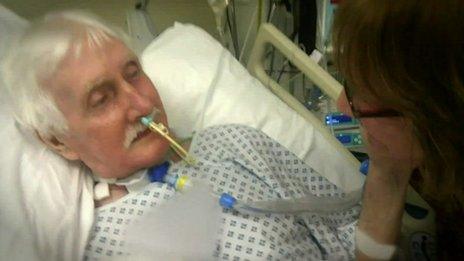David James death: Doctors 'right' to withhold treatment
- Published

David James' family had said doctors had no right to withdraw treatment
Judges were right to allow doctors to withhold treatment from a "gravely ill" guitarist, the Supreme Court has ruled.
David James, 68, of Liverpool, died in 2012, days after doctors successfully argued in court that stopping treatment was in his best interests.
Aintree University Hospitals NHS Foundation Trust said it was "pleased" the Court of Appeal ruling was upheld.
Mr James' family said that, although they had lost the appeal, they had "won the argument."
'Emotional but important'
The case was brought by Mr James' widow May James.
She appealed to the Supreme Court to rule on the decision to withdraw treatment from her husband who had become "gravely ill" while being treated in Aintree Hospital.
Mr James, a grandfather and father-of-three, had recovered from colon cancer in 2001 but had developed an infection which led to problems including multi-organ failure.
The hospital asked a High Court judge in the Court of Protection to agree they should withhold treatment if his condition deteriorated.
But his family wanted him to continue to receive treatment as they thought that he still had a "quality of life worth living."
The hospital's application was initially rejected but later backed by the Court of Appeal.
In upholding the ruling, Supreme Court judge Lady Hale said the Court of Appeal had "reached the right result but for the wrong reasons".
She said: "The trial judge applied the right principles and reached the conclusion which he was entitled to reach on the evidence before him.
"But by the time the case had reached the Court of Appeal, there had been a dramatic deterioration in Mr James' condition such that the Court of Appeal was entitled to grant the declaration that it did.
"Technically therefore, the appeal is dismissed. But the family have won the argument of principle."
The Supreme Court also emphasised the need to take into account not just the medical factors in the case, but "the patient's welfare in the widest sense", with great weight to be given to the patient's family life.
Speaking outside court, Mr James' daughter Julia said: "The Supreme Court said the Court of Appeal got the law wrong when it came to considering treatments for critically ill people."
'Value of human life'
She added: "We just hope this will help other families and patients going through similar situations.
"The Supreme Court has stressed the real value of human life and that's all we wanted."
A spokesman for the trust said: "It is clear that decisions surrounding best interests in some complex cases remain a difficult balancing exercise.
"This was an emotional but important case for all involved. The outcome does not detract from our sincere condolences to Mr James' family for their loss."
Mrs James' legal representatives said her husband "would have wished" doctors to prolong his life.
Solicitors Broudie Jackson Canter said the Supreme Court had stated the Court of Appeal was wrong to find that life-prolonging treatment of Mr James was "futile" and that he had "no prospect of recovery".
The statement added the appeal court judges were also wrong when they decided the wishes of a reasonable patient could be attributed to Mr James, who could not express his feelings.
Solicitor Sue Flynn said: "The finding that the Court of Appeal was wrong in its reasoning fully justified taking this matter to the Supreme Court.
"The fact that the court has set down very important principles for those caring for the critically ill will hopefully assist other families, which is of great importance to my client."
The Court of Protection, which is part of the High Court, analyses issues relating to sick and vulnerable people.
Mr James' family are now considering a further appeal to the European Court of Human Rights.
- Published26 July 2013
- Published4 January 2013